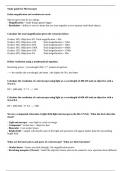College aantekeningen
Brazil: Democracy, Citizenship and Culture - Seminar Literature Summary
This lecture summary provides a detailed overview of information provided in the lectures of the course; with all the information provided by the lecturer and offers major insights needed for the exam. The course is taken in the Second year, as part of the major European History.
[Meer zien]





